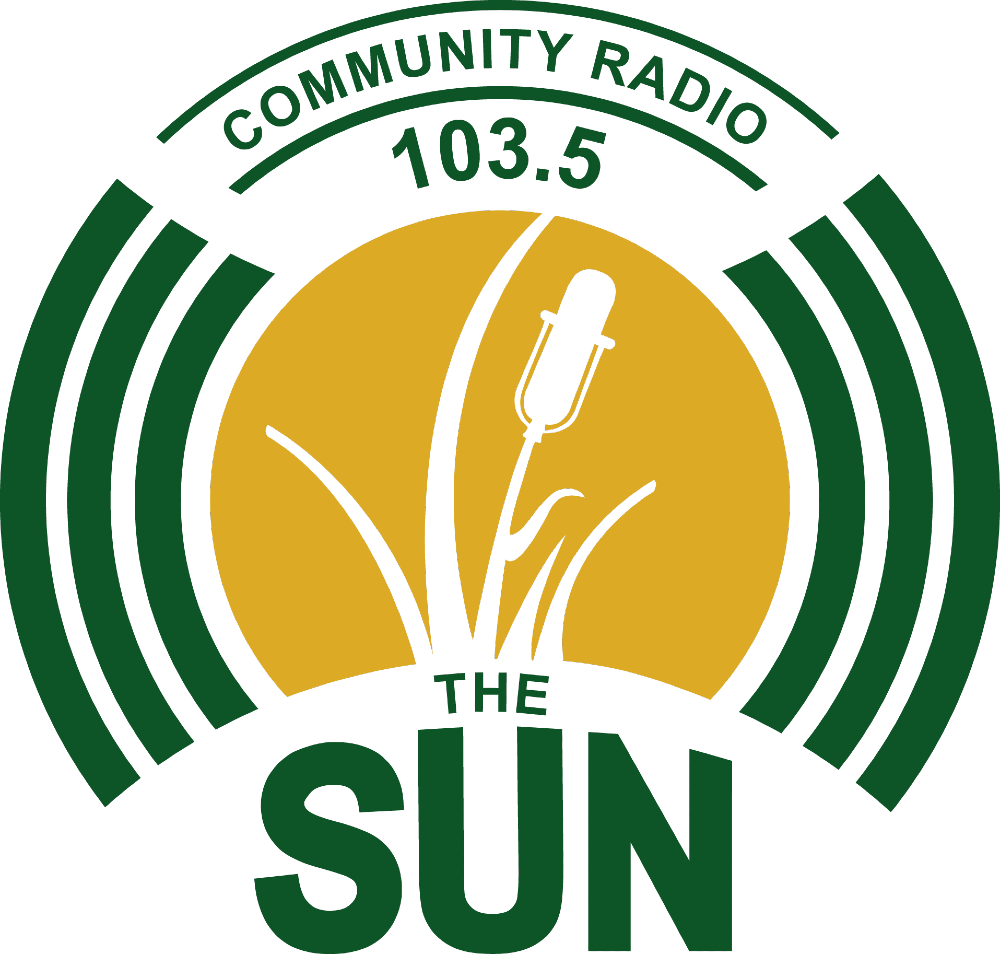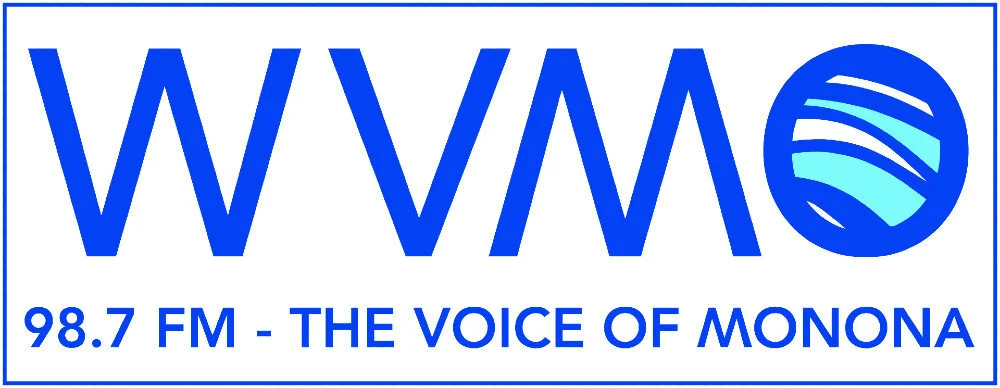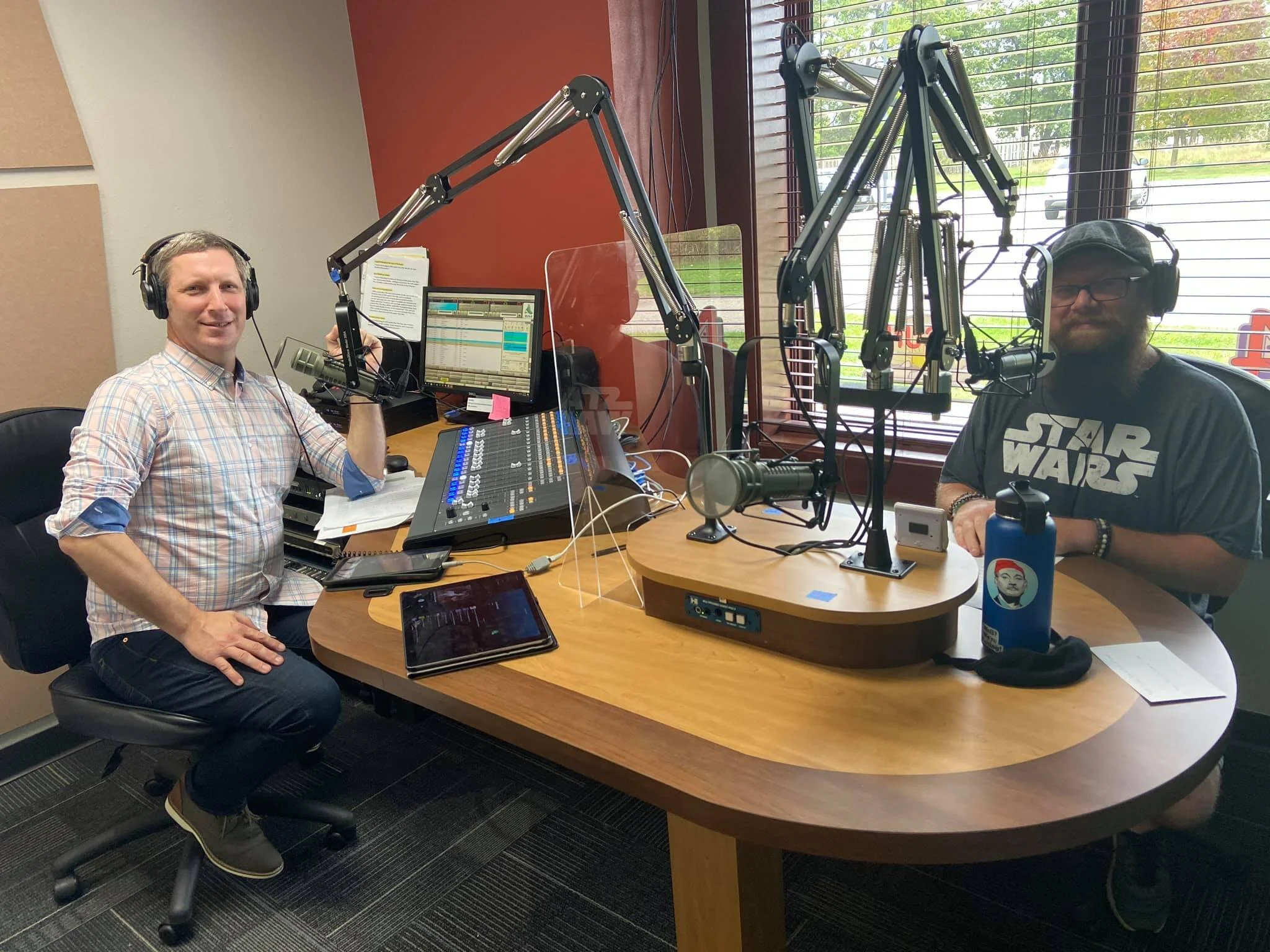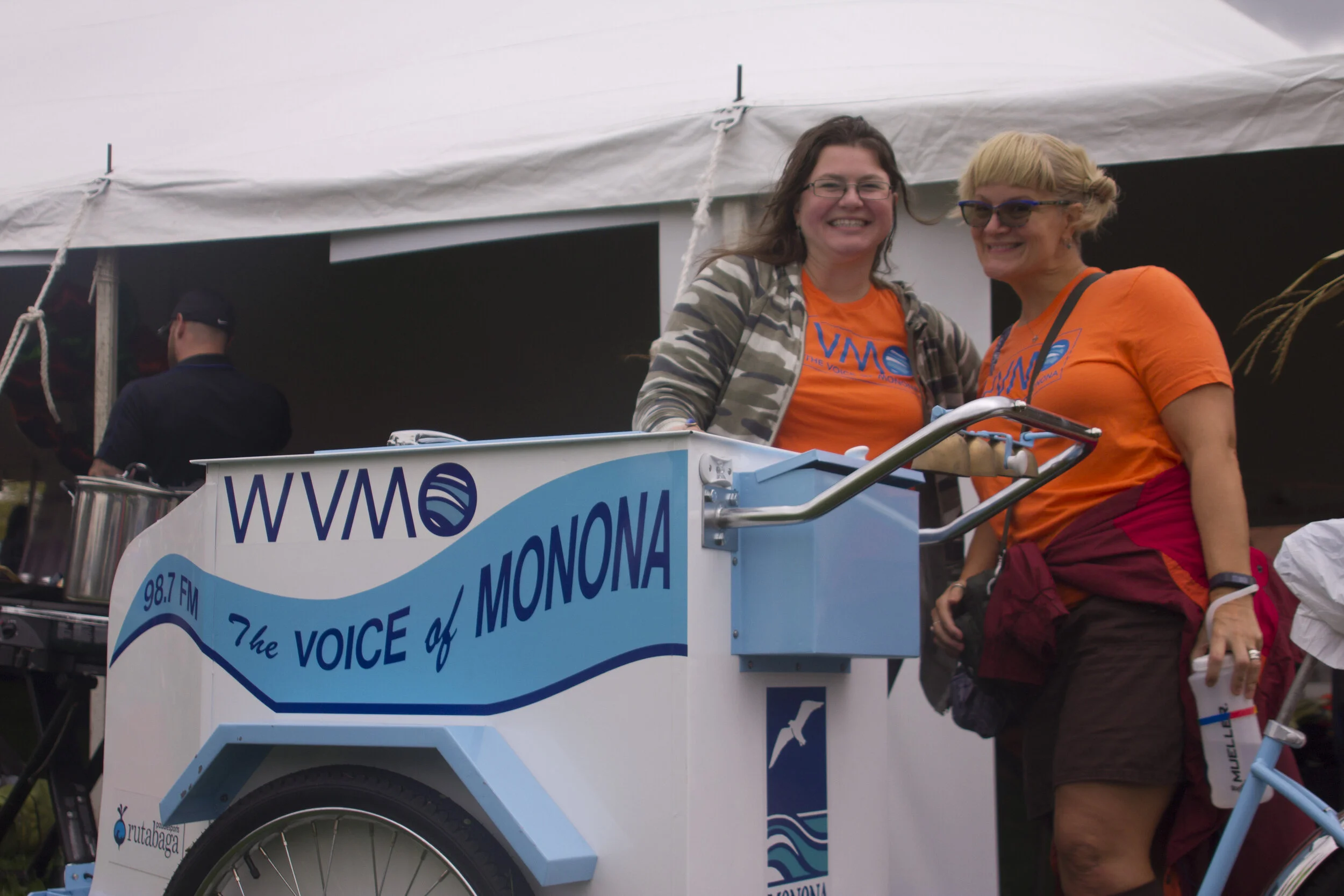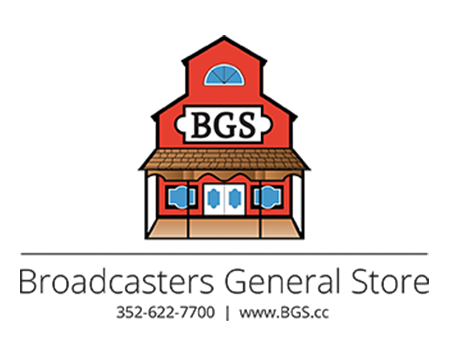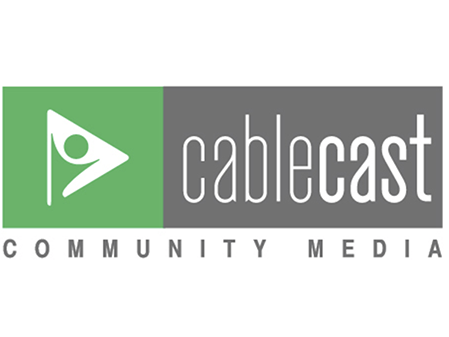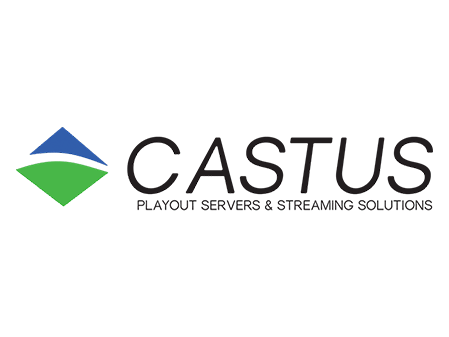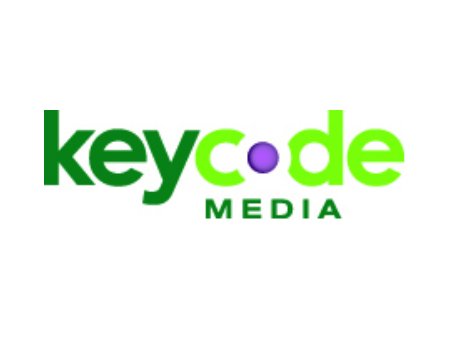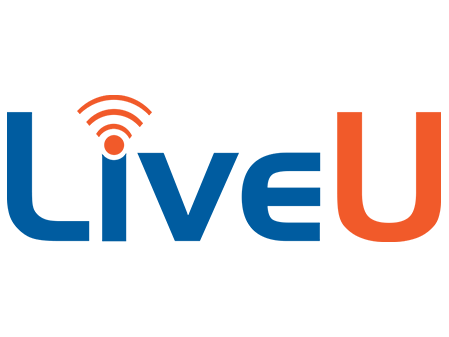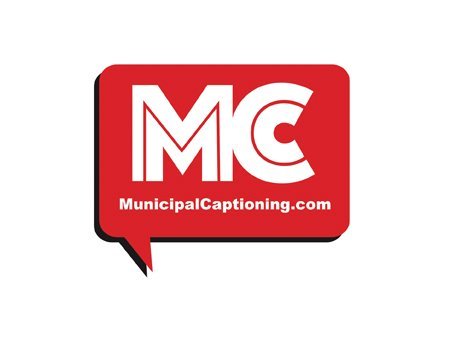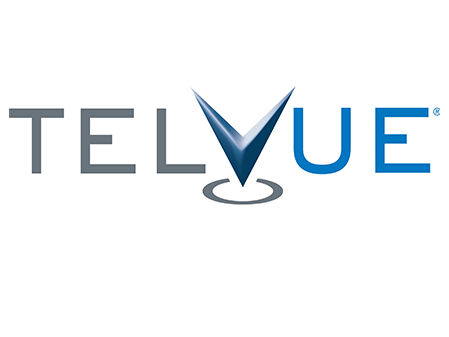Two Kenosha Public Library staff recording a library promo- Jennifer Kozelou and Heather Thompson.
Bringing community events into the homes of residents and serving the people of Kenosha – that is what Kenosha Community Media (KCM) is all about. This month’s Media Center Spotlight takes us to Wisconsin’s fourth largest city located on the shores of Lake Michigan. That’s where KCM, a non-profit public access television station, has long opened its doors to area residents and organizations that want to use media to get their message out. Some get training to produce their own shows and some turn to KCM to cover their events and issues.
Anyone can watch these local shows on Roku, YouTube and at kenoshamedia.org. But due to recent transitions, KCM cannot be seen right now on cable television where it has always occupied channel 14.
For 35 years, Kenosha Community Media (and its predecessor) operated out of a building now owned by Spectrum/Charter Communications. But last year, Spectrum announced it was selling the building and KCM would need to move. “It was a pivotal moment in the history of the station, to be suddenly faced with finding a new home after 35 years,” said Executive Director John Bloner, Jr. KCM turned to its long-time partner, Kenosha Public Library, for help, which has provided space within its Southwest Branch for staff and operations.
Kenosha Community Media community producers make use of the green screen at The Hub. From left to right is Rick Appleby floor directing, Ray Parrish hosting and Pamela Mundling operating the camera.
The new digital media creation lab dubbed “The Hub” sports a wealth of tools for television production that library patrons from Kenosha, Racine, Walworth, and Rock Counties may use for free. Field camera check-out kits, a two-camera production studio with a Tricaster switching system and a green screen, plus three Mac editing suites are available. The staff supervises the area and teaches residents how to use the equipment.
Over the years, hundreds of community members have come through the doors of KCM and produced thousands of hours of programming. Long-time Media Coordinator Jason Rimkus says about his experience with KCM, “I am most proud of the community itself. We have great community members that support and like what we do. They always advocate and recommend KCM to those who don’t know about it yet.” Jason is just as passionate about his work at KCM as the community is about having their very own TV station. “I never look at the clock. I’m usually focused on the next show, the next community event.”
Jason, who started with the station in 1997, believes that a strong local media is important not only to Kenosha, but to every city in Wisconsin. He’s concerned about state and national changes in law that make it increasingly difficult for gems like Kenosha Community Media to exist, and firmly believes in letting our elected officials know how important community media is. “Going to the Capitol with WCM to lobby was a great experience,” he says. “Just to sit down and talk with our representatives and let them know what we do at community media centers was a special opportunity.”
On the left a Kenosha Public Library staff member with Rich Schmerling current board member for Kenosha Community Media. Rich was at the Kenosha Area Chamber of Commerce Expo at the Kenosha Public Library booth.
For many years in Kenosha, the delivery of public access TV/community media services was a joint responsibility of city government and the cable company. A city commission oversaw the management of the public access TV station, but the cable company provided space in its building and staffed its operations. This arrangement was unique in the state and it continued for decades until the end of 2003 when the local cable franchise was renegotiated at renewal with the caveat that the cable operator, at that time Time Warner Cable, would no longer provide staffing and that the city would eliminate its cable TV commission.
As a result of the new agreement, the city directed its legal office to oversee the incorporation of a 501(c)(3) organization to be called Kenosha Community Media. This included writing bylaws and developing operating rules and regulations as well as handling any other legal issues for the non-profit. The city appointed John Bloner, Jr., at that time a city employee, to be the liaison between the City and KCM, working with the nonprofit's board of directors, supervising staff, and ensuring KCM met all state and federal requirements. In addition, the city directed its human resources department to work with the organization on any personnel matters. The city made provision for the non-profit to have an annual operating budget and gave the city’s finance department the responsibility to create a trust to hold the nonprofit's funds and to manage its accounts.
The 2003 agreement with Time Warner Cable required the company to pay a one-time capital expenditure for an upgrade of KCM’s studio and cable TV channel to digital technology, and quarterly payments for capital improvements. However, the quarterly payments ended in 2011, as a result of a law passed by the state in 2007 that voided all local franchise agreements and replaced them with a state license. (Companies could have elected to honor the local agreements they negotiated, but none did). To date, KCM has seen a reduction in funding of about $450,000 because the state passed the Cable Competition Act (WI 2007 Act 42).
In 2016, Spectrum/Charter Communications bought the Time Warner franchises in Wisconsin and four years later, it announced plans to sell its Kenosha property, notifying KCM it would need to vacate the building by the fall of 2020. Because KCM's cable TV signal originated in Spectrum's building, KCM's channel went and remains dark. The city is paying Spectrum to install an origination line for the public access channel at the Southwest Library branch. Spectrum anticipates that Channel 14 will be back on the line-up in March.
From left to right- Ralph Piro-Media Services Specialist, Rich Schmerling board member, Dan Stika board member. All three were recording the Kenosha Literacy Council Spelling Bee event.
The city has stepped in to help KCM with the move and with marketing its new location by allocating an additional $5,000 to the organization this year. “2020 challenged us, but we are optimistic about the future,” said Jason. “KCM is settling well into its new space and we’re doing what we have always done - offering production facilities and training and bringing community events to the screen for those who cannot attend.” During COVID-19, that mission is even more important. “We’re here to keep people connected to each other,” said Jason, “now more than ever.”
KCM invites you to view their content on YouTube, Roku, and kenoshamedia.org. You can also follow them on Facebook @kenoshamedia. KCM also invites you to visit The Hub. Just make an appointment by calling (262) 564-6103. Its Southwest Library studio is open 9 a.m. to 5 p.m., Monday through Saturday, and Sundays, Noon to 4 p.m. Staff is available to assist community producers during these times and training is offered one-on-one.
Facebook: @kenoshamedia
Youtube: https://www.youtube.com/channel/UCjBwpIyzNoTsr00YpDEWtTA





